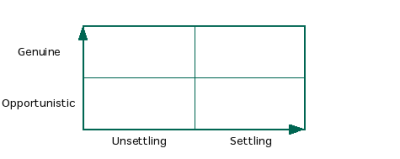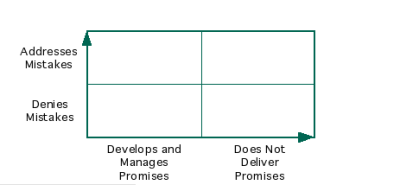Worldzenship
This blog explores our increasingly networked world and how this phenomenon is changing our understanding of freedom, solidarity, or citizenship.
November 8, 2006
Assessing Political Patterns
The main incentives in current political practices run in the opposite direction from dealing constructively with dying collectives, such as the oil industry we highlighted in the previous post. The overwhelming majority of politicians organize their discourses and platforms targeting the “average” voter, so that they can capture their votes. However, the technology for simply capturing votes is neither conducive to major innovations in social practices, nor with displacing obsolete collectives. It is conducive to stagnation.To help think about this problem,we have created a few criteria to segment politicians, other than by-partisanship. We have defined two axes. The first axis goes from the extreme of marketing oriented politicians that organize themselves to meet the average “mindset” of the voters, to the other extreme in which the politicians organize themselves to destabilize the current dominant “mindset.” In other words, politicians that settle their audiences in an already obsolete average understanding of situations, and politicians that unsettle their audiences freeing them or making them potentially open to previously unavailable futures.
The second axis goes from politicians that are hyper-adaptive to circumstances so they reorganize their point of view and commitments based in their individual opportunities to gain political power at one end to the other extreme in which politicians that have a core set of values and concerns that constrain the way in which adaptive moves and evolution may unfold at the other.

Of course, what is being unsettled or what constitutes a genuine ethical evolution are very challenging assessments that will be controversial and will require practical engagement with real situations. These axes, settling-unsettling and opportunistic-genuine, may be useful to assess the historical leadership of a particular politician.
To assess the operational execution of a politician we propose a different pair of axes. The first axis runs from politicians that do not manage her/his the promises to her/his constituencies to the opposite pole of politicians that do manage her/his promises to her/his constituencies. At the latter pole, s/he is a politician that is able to address the evolving concerns of her/his constituencies making clear promises, and delivering them.
The second axis is about their capacity to handle and learn from breakdowns and mistakes. In one extreme is the official that denies mistakes and on the opposite side is the one that addresses, take responsibility, repairs damage and learns from mistakes.

Exploring Dying Social Collectives
When a dominant social collective, such as the oil industry, becomes obsolete, it not only loses its capacity to produce value for the society in a sustainable way, but its economic inertia, interpretative habits, emotional addictions, moral attachments, and the future it offers both create and expand enormous social and economic waste.Let's, in this post, explore the end phase of social collectives. We propose two significant features. First, the value of the collective is justified in terms of an easy to digest, obvious ethical simplification (something that is already available in the interpretative patterns of the average citizen; it may be something such as “expanding freedom,” “letting the market work,” “spreading democracy,” “building a safe future for our children,” etc). Second, those in power remain in power and keep the collective alive by depleting social capital and transferring it to themselves through exploiting their political dominance in multiple social networks. The oil industry, for example, has built over the decades of its existence a pervasive network of relations with upstream industries, such as transportation, or manufacturing. It has intimate relations with government institutions and agencies, e.g., the Departments of Defense and State, to project and protect its interests. It has close collaborative links with a network of politicians, think tanks, and research institutions to frame controversial issues in their favor. The industry and its constitutive companies including Chevron Texaco and Exxon Mobil does not have to pay for cleaning pollution and its accompanying health problems, restoring biodiversity, or paying for the building, training and support of the army that protect their interests -- all social costs stemming in whole or in part from its operations.
This phenomenon of rhetorical manipulation combined with social depletion is neither exclusive to the oil industry nor a fully conscious and deliberate conspiracy. It is simply and purely what occurs in the deterioration phase in the life cycle of a particular collective, nothing else. But can our politicians and ourselves make this unavoidable cycle of deterioration less wasteful and more nurturing for all of us? Can we learn to make life more livable going forward as a social collective dies? We will address this question in the next post.
These are large, even vast, questions and what we write, based on my thinking and that of some friends is necessarily limited. We invite your contributions, suggestions, and recommendations.